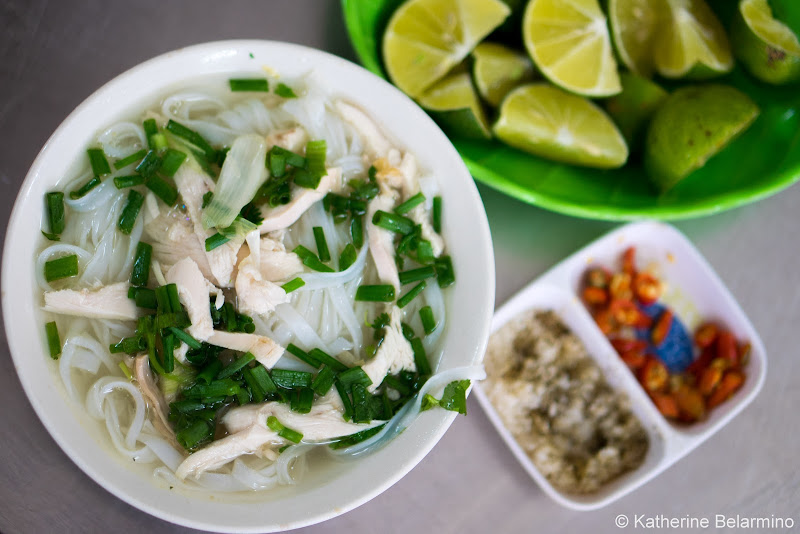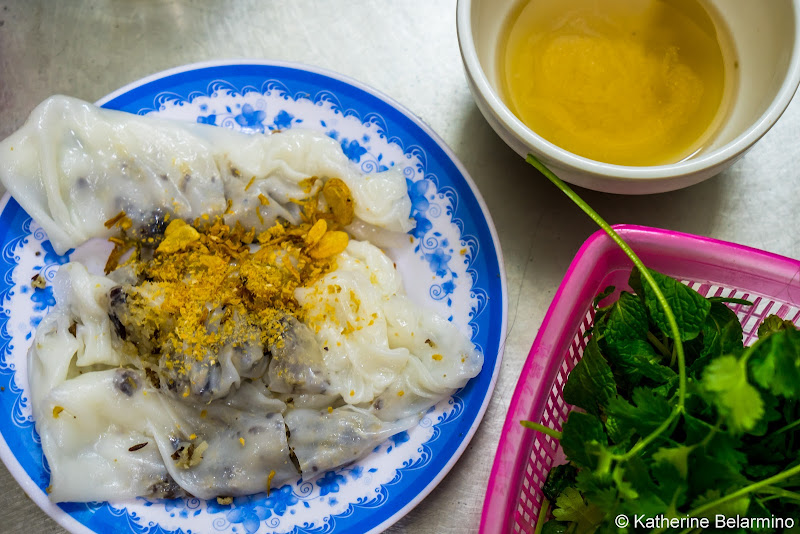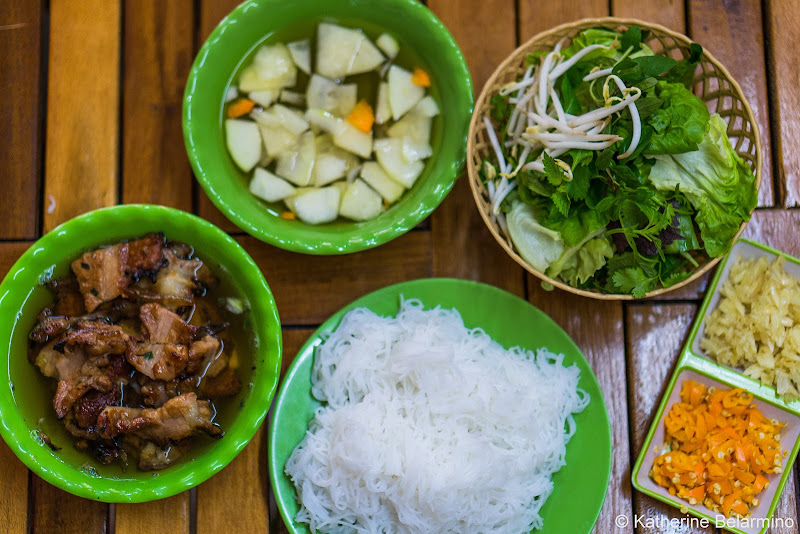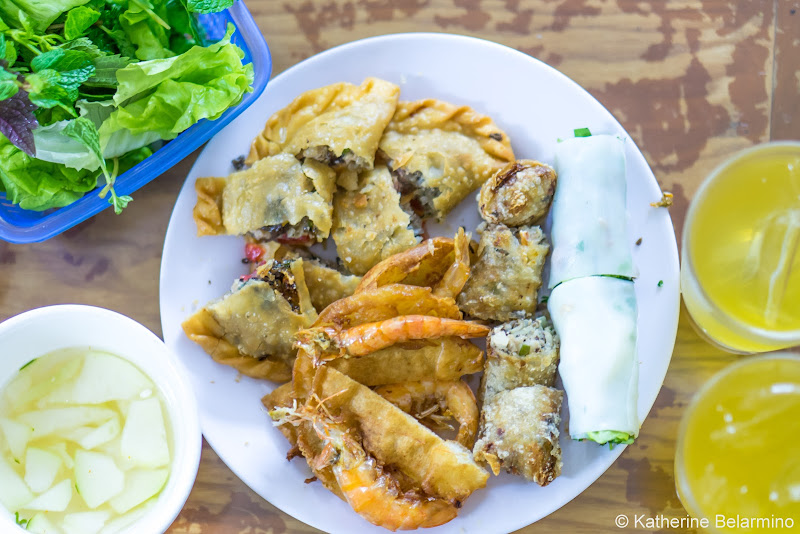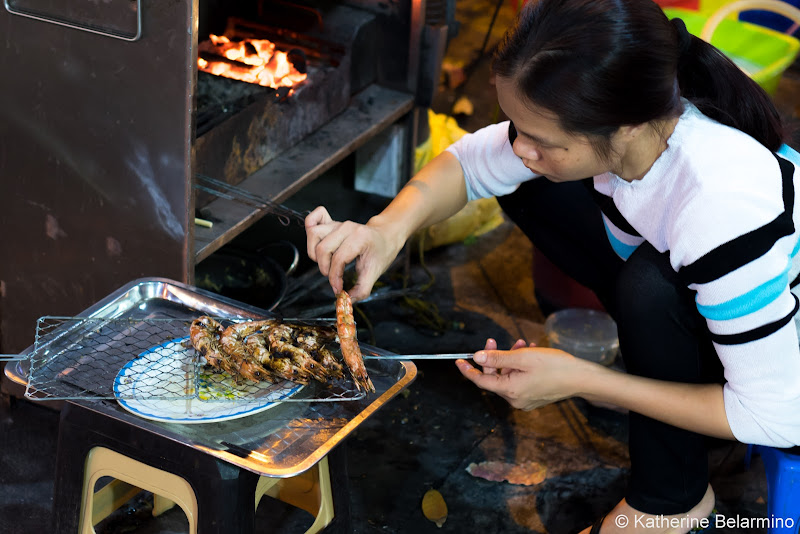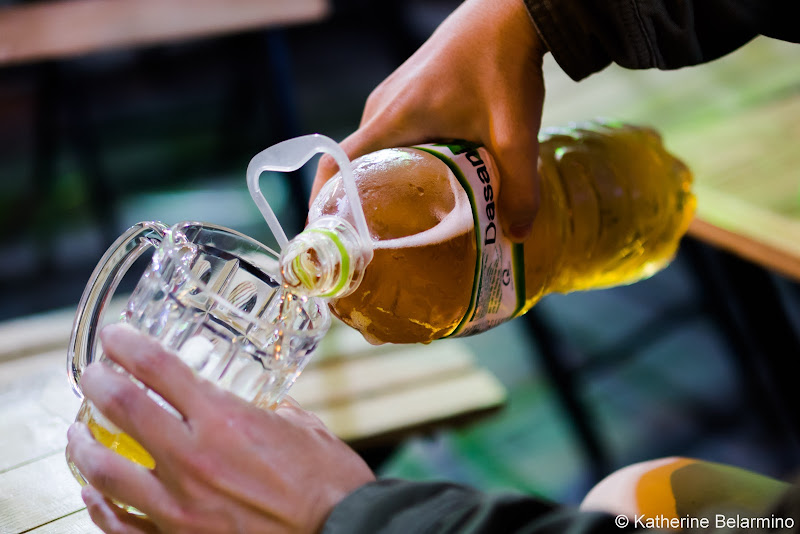There are so many things to be excited about when traveling to Vietnam, but one of the things we were really looking forward to was trying Vietnamese cuisine. We were traveling with Viking River Cruises on their Magnificent Mekong river cruise trip, so we weren’t sure how many opportunities we would have to eat traditional Vietnamese food. We actually had a number of occasions to try Vietnamese dishes, but one of the best decisions we made was to spend some time taking two street food tours in Hanoi with Duc Ivan, owner of Hanoi Street Food Tours.
We learned from Duc that in order to try the best of a certain Vietnamese dish, you should visit one of those hole-in-the-wall restaurants that only serve that one dish. So while you can get Vietnamese ph? many places, the best ph? is going to be at a place that only makes ph?.
Finding the right places could be a little tricky for travelers, so we were happy to have Duc take us to some of the best Vietnamese food places Hanoi has to offer. It also helps to have someone that speaks the language help navigate the maze of streets filled with tiny eateries with short tables and plastic stools. But we were able to find a few things on our own too.
We loved that these restaurants usually had the name of the dish they made as the name of the restaurant. These places don’t have a kitchen in the back, they’ve got a woman at the entrance, squatting on a short stool, cooking the food in plain sight to lure hungry customers in (plus its cooler by the door and the smoke and steam can get out).
Ph? (Noodle Soup)
If there is one Vietnamese dish that everybody knows, it is ph?. But before you order ph?, you should know how to say ph?. It is not pronounced foe. It is not even pronounced fu. Ph? is actually almost a two syllable word. Its pronounced fu-u, and the beginning and end of the word are said at the same tone while dropping a tone in the middle. Ph? is a Vietnamese noodle soup that can be made with either chicken or beef. Also, ph? is most commonly eaten for breakfast, so many hotels serve it in the morning.
Where to try ph?: Bún Thang, 33 Hàng Hòm, Hanoi, Vietnam.
Bánh Mì (Vietnamese Sandwich)
While bánh mì is typically the term used to describe the Vietnamese sandwich, the term bánh mì is actually the name of the bread and literally translates to mean wheat bread. This bread is the French baguette, the extremely flaky and crunchy bread introduced to Vietnam by the French during the colonial period. Bánh mì can be filled with meat such as pork belly, grilled pork, or grilled chicken, accompanied by vegetables both fresh and pickled.
Bánh Cu?n (Rolled Cake)
Bánh cu?n is a popular dish in Northern Vietnam which we were even able to try in a couple of our hotels. Bánh cu?n must be eaten fresh and hot. It isn’t just delicious to eat, it is also fun to watch being made. Bánh cu?n starts with the most delicate of wrappings made by steaming a thin layer of fermented rice batter. The sheet is expertly lifted and rolled off of a cloth stretched over a pot of boiling water and then filled with minced pork and mushrooms. The roll is then topped with fried shallots and cilantro and dipped in a vinegary sauce to which pickled garlic, hot sauce, and kumquat juice can be added.
Where to try bánh cu?n: Bánh Cu?n Nóng, 14B B?o Khánh, Hanoi, Vietnam.
Bún Ch? (Barbecue Pork Noodle Soup)
My favorite Vietnamese dish was bún ch?, a barbecue pork noodle soup. Bún ch? starts with barbecue pork, both slices of pork and pork patties. The pork is served with rice vermicelli, both of which are put into a bowl of “soup” of vinegar, sugar, and lime. The version we had also had green papaya, garlic, yellow peppers, and black pepper.
Where to try bún ch?: Bún Ch? Que Tre, 27 ?ào Duy T?, Hanoi, Vietnam.
Bánh G?i (Pillow Cake)
Bánh g?i is one of Vietnam’s deep-fried treats that is perfect for a cold winter’s day. Don’t think Vietnam has cold days? Well, we agree, but the people of Vietnam think it gets pretty cold when the temperature falls below 80 degrees. They even wear scarves, gloves, and knit caps! Whether or not you think it’s cold, Vietnamese pillow cakes are a crunchy delight filled with minced mushrooms and pork. Quán G?c ?a in Hanoi near St. Joseph’s Cathedral specializes in pillow cake. It’s a favorite with tourists, but it is the place to go for pillow cake.
Where to try bánh g?i: Quán G?c ?a, 52 Lý Qu?c S?, Hanoi, Vietnam.
Nem Cua B? (Crab Fried Spring Rolls)
I wrongly assumed that fried spring rolls were an American version and that fresh spring rolls are what is eaten in Vietnam. Quite the opposite, fried spring rolls are abundant while we fresh spring rolls didn’t seem to be quite as common. Quán G?c ?a in Hanoi has another fried specialty, and that is the crab fried spring roll. Fried spring rolls are delicious, but the addition of crab takes this version over the top.
Where to try nem cua b?: Quán G?c ?a, 52 Lý Qu?c S?, Hanoi, Vietnam.
Bánh Tôm (Shrimp Cakes)
Yet another fried treat we tried at Quán G?c ?a was shrimp cakes. These were simple fried cakes topped with a whole shrimp.
Where to try bánh tôm: Quán G?c ?a, 52 Lý Qu?c S?, Hanoi, Vietnam.
Bánh Xèo (Sizzling Pancake)
Bánh xèo is a sizzling rice flour cake, topped with green onion and bean sprouts, which is fried in a lightly oiled pan until crispy, then folded in half and chopped into large pieces. But there’s more. Bánh xèo is eaten by taking a translucent piece of rice paper, topping it with green herbs and a piece of the fried cake, which is then rolled tightly before being dipped in sauce and eaten. Wrapping these is an art form, kind of like rolling a tight cigar, and I was fascinated watching a girl on her lunch break deftly constructing her rolls with the help of her chopsticks.
Where to try bánh xèo: Bánh Xèo, Nem Cu?n, Qu?y Nóng, 22 Hang Bo, Hanoi, Vietnam
Bún Bò Nam B? (Vietnamese Beef Noodle Salad)
I was surprised by how many times I heard the word vermicelli, something I always associate with Italian, in describing Vietnamese dishes. Bún bò nam b? starts with beef marinated in sugar, fish sauce, and seasonings, which is quickly cooked upon ordering and combined with vermicelli noodles and vegetables along with a tangy sauce of fish sauce, sugar, lemon, and chili. The mixture is topped with items such as fried shallots, roasted peanuts, and bean sprouts.
Seafood
Obviously, seafood is not unique to Vietnam, but I didn’t realize until I started doing some research that seafood is a thing in Vietnam. It shouldn’t have been a surprise since so much of the country of Vietnam is South China Sea shoreline.
During our food tour with Hanoi Street Food Tours we feasted on clams with lemongrass; cockles; oysters baked with peanuts; sweet shrimp fileted, filled with onions, and grilled over the coals on a barbecue on the sidewalk; steamed ocean crab; and rice vermicelli with bean sprouts and crab. For a dipping sauce, we used a simple combination of salt, kumquat juice, and red chilies.
After our seafood feast, our guide showed us how to get the seafood smell off our hands by washing our hands in a tub of water and tea leaves. During other parts of our trip, we also had stuffed crab and tilapia.
Where to try Vietnamese seafood: H?i S?n Ph??ng Uyên, 39 Hàng L??c, Hanoi, Vietnam.
Raw Herbs
Something else I wasn’t expecting about traditional Vietnamese food was the abundance of fresh herbs, not used in cooking which I did expect, but used as a fresh side dish. At many of the restaurants we visited on our food tour with Hanoi Street Food Tours we were provided with baskets of fresh herbs to accompany our ordered food. Just a few examples of the fresh herbs you’ll find in Vietnam are cilantro, Vietnamese mint, purple perilla, and sawtooth herb (ngò gai).
Cà Phê Tr?ng (Egg Coffee)
Vietnamese egg coffee was first invented in the mid-1900s by Nguyen Giang when he was a bartender at Hanoi’s Sofitel Legend Metropole Hotel and whisked an egg into coffee because milk was scarce during the French War. In 1946 he opened Giang Café, which to this day is the best place to try egg coffee. The primary ingredients of egg coffee are egg yolk, Vietnamese coffee powder, and sweetened condensed milk. Giang Café’s website also mentions butter and cheese. The coffee is brewed in a small cup and then the rest of the ingredients are whisked in. The cup is served in a bowl of hot water to maintain the temperature. Egg coffee can also be ordered on ice.
Where to try egg coffee: Giang Cafe, 39 Nguyen Huu Huan Street, Hanoi, Vietnam
Bingsu Th?p C?m (Shaved Ice Dessert)
For a sweet treat on a warm day (warm for us but clearly not so for the locals since they were in long sleeves and puffy jackets), we had a refreshing dessert of shaved ice topped with sweetened condensed milk, mango, papaya, dragon fruit, and lychee. After stuffing ourselves with so many Vietnamese dishes, bingsu th?p c?m was a nice palate cleanser that wasn’t too filling.
Where to try bingsu th?p c?m: Hoa Qu? D?m Hoa Béo, 17 Tô T?ch, Hanoi, Vietnam
Che? S??ng Sa Ha?t L??u (Rainbow Dessert)
While strolling through Sa ?éc’s market I noticed trays of knotted plastic bags bulging with creamy white liquid and colorful bits of jelly. I learned that they were dessert soups called che?, which are made with coconut milk and a variety of ingredients. I chose the che? s??ng sa ha?t l??u, a colorful mixture of agar jelly, mung bean paste, tapioca and water chestnut faux pomegranate seeds, and coconut milk. It’s eaten with a spoon after pouring over ice.
Where to try che? s??ng sa ha?t l??u: Sa ?éc Market, Vietnam
K?o L?c (Peanut Brittle)
I have always loved peanut brittle and Asian countries make this sweet crunchy treat. While in Cai Be we took a tour of a place that makes rice paper and candy. Vietnamese peanut brittle can be found in many shops.
Bonus – Vietnamese Beer
Not a traditional Vietnamese dish, but beer is a popular alcoholic beverage in Vietnam. Vietnamese beer is light and fresh, usually a lager. Vietnamese beers aren’t exceptionally flavorful, rather they are perfect for hot days or as an accompaniment to flavorful Vietnamese food. Some popular Vietnamese beers are 333, Bia Ha Noi, and Bia Saigon Special. The best Vietnamese beer experience is having some fresh from the tap, possibly brought to the table in a plastic bottle.
The Vietnamese equivalent to saying cheers over a glass of beer is m?t, hai, ba, vô (one, two, three cheers), or simply vô. In the south the word for cheers sounds like saying yo, while in the north the last word is dzô and the pronunciation sounds more like djo.



